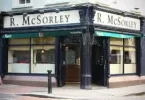RAI launches Pre-Budget Submission
Discussing the submission at its launch in Buswells Hotel recently RAI Chief Executive Adrian Cummins noted that “retaining the 9% VAT rate in particular is vital to the continuing growth of the tourism and restaurant sector”.
Together the food service and accommodation sectors currently employ 152,200. An increase of 1% in VAT would see approximately 6,000 jobs lost in the sector, particularly in the border and midland regions.
“In our Pre-Budget Submission, we set out a number of objectives that needed to be met,” commented Adrian Cummins, “We stressed that Budget 2018 needed to put Tourism, Hospitality and Food at the centre of our recovery. The Retention of VAT at 9% into 2018 and beyond is crucial to not only the sustainability of restaurants and businesses in the tourism sector but also to job creation and the continued growth of our economy.”
The success of the lower rate of VAT is evident in the 37,800 direct new jobs and 17,388 indirect jobs that have been created since its introduction in 2011, he said.
The submission proposes actions to ensure that the Restaurant and Tourism Sector can continue to recover:
Hospitality Skills and Recruitment
Currently, 1,800 chefs qualify each year from certified culinary training programmes. In 2015 the Expert Group on Future Skills Needs report on the Hospitality sector identified a deficit of 5,000 chef trainees annually. The key findings of the report found that the skills shortage is across all levels, most notably amongst chefs and cooks. Whilst the long-term goals and target number of trainees for the national apprenticeship programme are welcomed, in the short term the industry’s facing a massive crisis in the shortage of skilled labour, most notably among chefs. Educational providers across the IOTs and ETBs are creating culinary and hospitality training programmes, building kitchens & training restaurants – but there is no one or no body to co-ordinate these actions, states the RAI.
Action:
- Establish a National Tourism and Hospitality Training Authority
- Establish a new body for education, training and recruitment
- Short-term Work Permits for Non-EU qualified hospitality workers.
Insurance Premiums
Restaurants and other business in the hospitality sector such as hotels, pubs and nightclubs have seen huge hikes in their Public Liability insurance. These establishments are places of high public footfall. For those who’ve had a claim in the past five years – and in the case of restaurants, claims are mostly for those who trip/slip – premiums have doubled and in some cases trebled. This is not sustainable for any business. The industry has even seen some cases where the restaurant has had to close. In some cases restaurants are finding that if they’ve had a claim in the past five years their current insurance provider will not renew their policy.
Action:
- New measures to investigate what’s driving up insurance costs
- Personal Injuries Assessment Board: ensure it has ability to collect claims data.
Local Authority Charges
Commercial rates underpin the entire range of services provided by local authorities. The RAI recognises that local authorities are striving to maintain the delivery of high-quality local services in the face of increasing strained financial resources. However, as a business representative body it cannot dismiss the fact that businesses are now paying more rates for less services.
In some local authorities (urban areas) an additional rates charge has been levied to businesses; known as a Business Improvement District Levy this levy is seen by many as a double taxation. It’s mandatory for businesses to pay the levy if they fall into the catchment area. In some areas of the centre members benefit and others do not. In some areas, restaurants/cafes are also charged for Sandwich Boards outside their premises. This could be a one-off yearly fee of €75-€125.
Action:
- Comprehensive review of the commercial rates system with the aim of funding local government on a more equitable and sustainable basis. The system as it applies to restaurants is unfair and it needs to change
- Introductory ‘holiday rate’ for new restaurants to help them become established.
Excise Duty
Since 2012 excise on wine has increased by 62%. Ireland has the highest wine excise, the second-highest beer excise and the third-highest spirits excise in the EU28. Excise increases not only impact restaurants, hotels and pubs but these increases, introduced during the financial crisis as an emergency measure, have created significant cashflow issues for distributors and importers as many have to pay excise as an up-front cost.
Action:
- Reduction of 15% in excise duty on wines, beers & spirits.
National Tourism Policy:
The drop-off in tourist numbers from Great Britain by almost 7% for quarters 1 and 2 of 2017 compared to the same period in 2016 is cause for concern, states the RAI. Recent figures coming from a springboard report commissioned by Dublintown shows footfall in the capital was down 29% in 2016 compared to 2007, further showing that tourist figures have not returned to pre-recession figures.
Action:
- Greater investment in tourism capital than proposed in Government’s 2016 – 2022 strategy
- Development of “Ireland’s Lakelands” brand – including infrastructure
- A €12 million Brexit fund for the Tourism industry.








